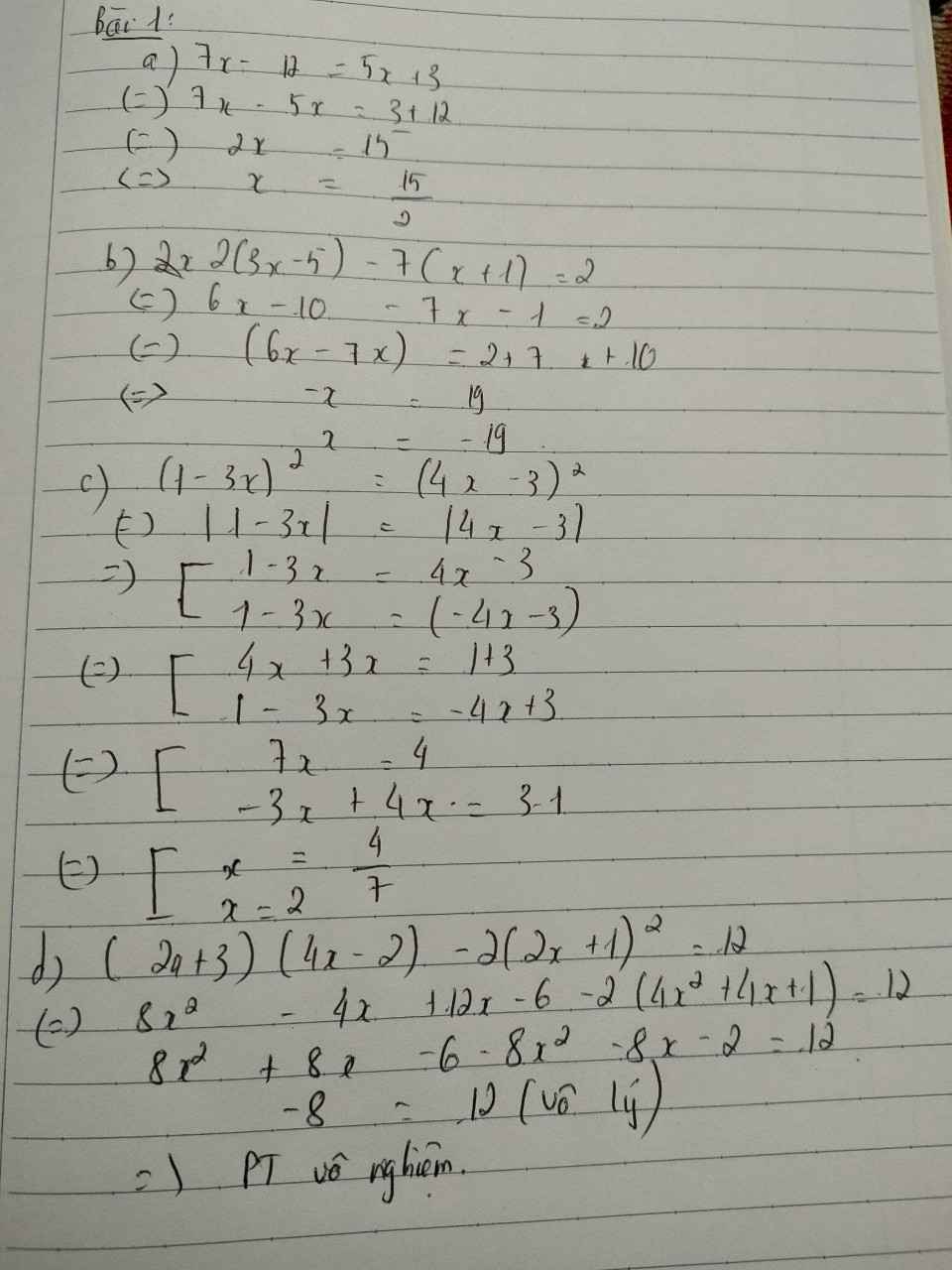tính D = 5x^2-7x+1 / 3x-1 với |x| = 1/2
Hãy nhập câu hỏi của bạn vào đây, nếu là tài khoản VIP, bạn sẽ được ưu tiên trả lời.




a) \(\left(3x-2\right)\left(3x-1\right)=\left(3x+1\right)^2\)
<=> \(9x^2-9x+2=9x^2+6x+1\)
<=> \(15x=1\) <=> \(x=\frac{1}{15}\)
b) \(\left(4x-1\right)\left(x+1\right)=\left(2x-3\right)^2\)
<=> \(4x^2+3x-1=4x^2-12x+9\)
<=> \(15x^2=10\) <=> \(x=\frac{2}{3}\)
c) \(\left(5x+1\right)^2=\left(7x-3\right)\left(7x+2\right)\) <=> \(25x^2+10x+1=49x^2-7x-6\)
<=> \(24x^2-17x-7=0\) <=> \(24x^2-24x+7x-7=0\)
<=> \(\left(24x+7\right)\left(x-1\right)=0\) <=> \(\orbr{\begin{cases}x=-\frac{7}{24}\\x=1\end{cases}}\)
d) (4 - 3x)(4 + 3x) = (9x - 3)(1 - x)
<=> 16 - 9x2 = 12x - 9x2 - 3
<=> 12x = 19
<=> x = 19/12
e) x(x + 1)(x + 2)(x + 3) = 24
<=> (x2 + 3x)(x2 + 3x + 2) = 24
<=> (x2 + 3x)2 + 2(x2 + 3x) - 24 = 0
<=> (x2 + 3x)2 + 6(x2 + 3x) - 4(x2 + 3x) - 24 = 0
<=> (x2 + 3x + 6)(x2 + 3x - 4) = 0
<=> \(\orbr{\begin{cases}x^2+3x+6=0\\x^2+3x-4=0\end{cases}}\)
<=> \(\orbr{\begin{cases}\left(x+\frac{3}{2}\right)^2+\frac{15}{4}=0\left(vn\right)\\\left(x+4\right)\left(x-1\right)=0\end{cases}}\)
<=> \(\orbr{\begin{cases}x=-4\\x=1\end{cases}}\)
g) (7x - 2)2 = (7x - 3)(7x + 2)
<=> 49x2 - 28x + 4 = 49x2 - 7x - 6
<=> 21x = 10 <=> x = 10/21

a: \(\Leftrightarrow9x^2-9x+2=9x^2+6x+1\)
=>-3x=-1
hay x=1/3
b: \(\Leftrightarrow4x^2+4x-x-1=4x^2-12x+9\)
=>3x-1=-12x+9
=>15x=10
hay x=2/3
c: \(\Leftrightarrow25x^2+10x+1=25x^2+25x-x-1=24x-1\)
=>10x-24x=-1-1
=>-14x=-2
hay x=1/7
d: \(\Leftrightarrow49x^2-28x+4=49x^2+14x-21x-6\)
=>-28x+4=-7x-6
=>-21x=-10
hay x=10/21

a. \(\left(3x-2\right)\left(3x-1\right)=\left(3x+1\right)^2\)
\(\Leftrightarrow9x^2-9x+2=9x^2+6x+1\)
\(\Leftrightarrow-3x=-1\)
\(\Leftrightarrow x=3\)

a: \(=2x^3:\dfrac{-3}{2}x+4x:\dfrac{3}{2}x-5:\dfrac{3}{2}\)
=-4/3x^2+8/3-10/3
=-4/3x^2-2/3
d: \(\dfrac{3x^3-5x+2}{x-3}=\dfrac{3x^3-9x^2+9x^2-27x+22x-66+68}{x-3}\)
\(=3x^2+9x+22+\dfrac{68}{x-3}\)

\(a. 2x(3x^2-5x+3) = 6x^3-10x^2+6x \)
\(b. -2x(x^2+5x-3) = -2x^3-10x^2+6x\)
c. \(-\dfrac{1}{2}x^2\left(2x^3-4x+3\right)
=-x^5+2x^3-\dfrac{3}{2}x^2\)
\(d.\left(2x-1\right)\left(x^2+5-4\right)=\left(2x-1\right)\left(x^2+1\right)=2x^3+2x-x^2-1\)
e. \(-\left(5x-4\right)\left(2x+3\right)=10x^2+15x-8x-12=-10x^2+7x-12\)
f.\(\left(2x-y\right)\left(4x^2-2xy+y^2\right)=\left(2x-y\right)\left(2x-y\right)^2=\left(2x-y\right)^3\)
g.\(\left(3x-4\right)\left(x+4\right)+\left(5-x\right)\left(2x^2+3x-1\right)=3x^2+12x-4x-16+10x^2+15x-5-2x^3-3x^2+x=-2x^3+10x^2+24x-21\)
e. \(7x\left(x-4\right)-\left(7x+3\right)\left(2x^2-x+4\right)=7x^2-28x-14x^3+7x^2-28x-6x^2+3x+-12=-14x^3+8x^2-53x-12\)

1.
a.\(\Leftrightarrow7x-5x=3+12\)
\(\Leftrightarrow2x=15\Leftrightarrow x=\dfrac{15}{2}\)
b.\(\Leftrightarrow6x-10-7x-7=2\)
\(\Leftrightarrow x=-19\)
c.\(\Leftrightarrow1-3x=4x-3\)
\(\Leftrightarrow7x=2\Leftrightarrow x=\dfrac{2}{7}\)
d.\(\Leftrightarrow8x^2-4x+12x-6-8x^2-8x-2=12\)
\(\Leftrightarrow-2=12\left(voli\right)\)

Ta có:
\(\left|x\right|=\dfrac{1}{2}\)
\(\Rightarrow\left\{{}\begin{matrix}x=\dfrac{1}{2}\\x=-\dfrac{1}{2}\end{matrix}\right.\)
Trường hợp 1: \(x=\dfrac{1}{2}\)
Thay vào D ta có:
\(D=\dfrac{5\cdot\left(\dfrac{1}{2}\right)^2-7\cdot\dfrac{1}{2}+1}{3\cdot\dfrac{1}{2}-1}=-\dfrac{5}{2}\)
Trường hợp 2: \(x=-\dfrac{1}{2}\)
Thay vào D ta có:
\(D=\dfrac{5\cdot\left(-\dfrac{1}{2}\right)^2-7\cdot-\dfrac{1}{2}+1}{3\cdot-\dfrac{1}{2}-1}=-\dfrac{23}{10}\)